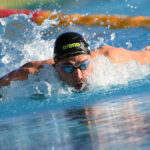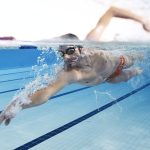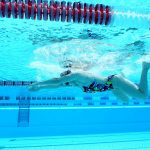When Are Babies Ready to Swim?
There is no clear consensus on when babies are ready to swim, so talk to your paediatrician about your child’s situation and developmental readiness.
In a previous post we discussed a few steps you can take to start introducing your baby to the water. For most parents, that’s enough in the early months. They use visits to the pool as a chance to bond and have fun together, and they just want their babies to learn to feel comfortable and enjoy being in the water.
But when are children ready for actual swimming lessons?
Babies do have natural reflexes that allow them to hold their breath under water and move their arms and legs in a primitive swimming motion, and some infant swimming programs take advantage of these reflexes to teach babies to swim. Many infant swimming classes begin at 6 months of age, and some start whenever the baby is strong enough to hold his or her head up. Not all experts agree that what these babies are doing is really swimming, though, or that it’s even a good idea to try to teach them so young.
Until five years ago, the American Academy of Pediatrics recommended against swimming lessons for children under 4 years old, arguing that there was no evidence that earlier lessons actually led small children to become competent swimmers or reduced the risk of drowning. In 2010, however, the organization revised its guidelines to indicate that children as young as 1 year old could benefit from swimming lessons, based on two recent studies (one performed in the United States and one in China) suggesting that water safety classes might indeed prevent toddler drowning deaths. The organization stresses, though, that swimming lessons can never ‘drown-proof’ anyone, so be sure to continue to provide close supervision whenever your child is near water, even if he or she has taken swimming lessons.
The decision to start your child in swimming lessons should be made together with your paediatrician, based on your particular child’s developmental readiness, both physically and psychologically, as well as where you live and your child’s likely exposure to water.
For very young children, classes that emphasize water safety (such as learning to turn over and float) can be helpful, but be sure to look for a teacher who offers encouragement rather than forcing children to do something they’re not ready for. If your child screams and cries, you’re better off waiting and trying again later, as early trauma can create a lifelong aversion to water.
Class size is important as well. There should be no more than 10 students per instructor (less if the children are very young), and there must be a lifeguard on duty in addition to the teacher. Many classes require a parent to be in the water with each child; this helps parents learn safety measures as well as providing added supervision during the class.
So in conclusion, if you’re enrolling your infant in swimming lessons in order to create the next Olympic champion, you’re probably wasting your time; your child likely won’t have any particular advantage over those who waited until age 4 or so to start formal lessons. If you’re looking at survival-focused swimming classes for infants, you’ll have to assess the pros and cons in terms of the time and cost involved, your baby’s enjoyment or lack thereof, and your family’s overall risk profile (based on how much time you spend around water, for example). In any case, learning to enjoy the water and feel comfortable in the pool environment from an early age can make swimming lessons more pleasant when the time comes, and there’s no disputing the fact that swimming is an important life skill that every child should learn, even those who have no interest in swimming recreationally or competitively.
What has been your experience? What do you think makes a child ready for swimming lessons?
—————







